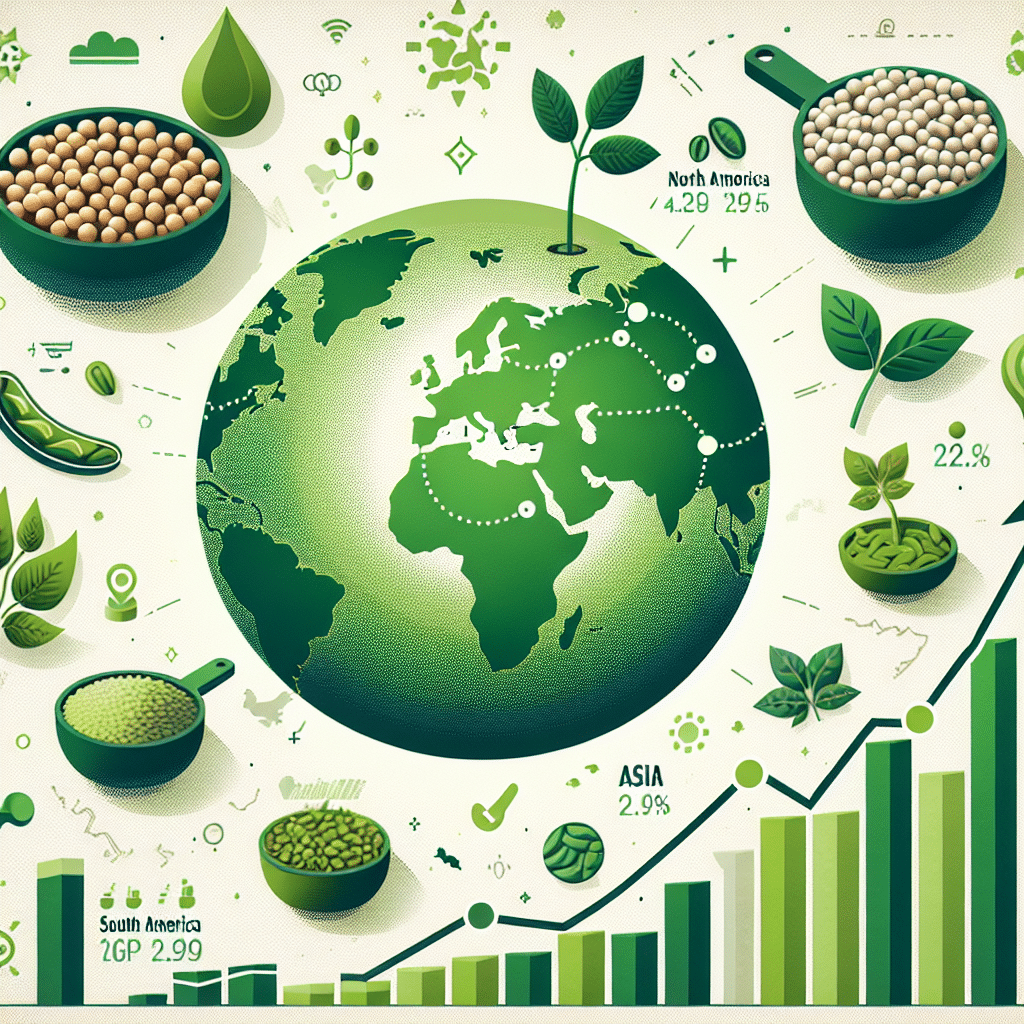Global Plant-based Protein Market: Current State and Trends
-
Table of Contents
- Plant-Based Protein Market: Insights and Emerging Trends
- Current State of the Plant-Based Protein Market
- Key Trends in the Plant-Based Protein Market
- 1. Diversification of Protein Sources
- 2. Technological Advancements
- 3. Expansion into New Categories
- 4. Clean Label and Health Focus
- 5. Sustainability and Ethical Considerations
- Case Studies and Success Stories
- Challenges and Opportunities
- Conclusion: The Future of Plant-Based Proteins
- ETprotein: Your Partner in Plant-Based Protein Solutions
Plant-Based Protein Market: Insights and Emerging Trends

The global plant-based protein market has been experiencing a significant surge in demand over the past few years. This growth is driven by a variety of factors, including the rise in veganism, health consciousness among consumers, environmental concerns, and the increasing number of people with lactose intolerance and allergies to animal proteins. In this article, we will delve into the current state of the plant-based protein market, explore the latest trends, and examine the factors contributing to its growth.
Current State of the Plant-Based Protein Market
The plant-based protein market has been expanding rapidly. According to recent market research reports, the industry is expected to continue its growth trajectory in the coming years. This growth is fueled by the increasing availability and variety of plant-based protein products in supermarkets, health food stores, and online platforms.
- Consumer Demand: A shift in consumer preferences towards healthier and more sustainable diets has led to a higher demand for plant-based proteins.
- Product Innovation: Food manufacturers are continuously innovating and expanding their product lines to include a wider range of plant-based protein options.
- Investment: There has been a significant increase in investment from both venture capitalists and established food companies in plant-based protein startups.
Key Trends in the Plant-Based Protein Market
Several trends are shaping the future of the plant-based protein market:
1. Diversification of Protein Sources
While soy and wheat have traditionally been the primary sources of plant-based proteins, there is a growing interest in alternative sources such as peas, rice, hemp, and algae. This diversification is driven by the desire to improve the nutritional profile and taste of plant-based products and to cater to consumers with soy and gluten allergies.
2. Technological Advancements
Advancements in food technology have enabled manufacturers to improve the texture and flavor of plant-based proteins, making them more palatable to a broader audience. Techniques such as fermentation and extrusion have been pivotal in creating products that closely mimic the taste and texture of animal proteins.
3. Expansion into New Categories
Plant-based proteins are no longer limited to meat substitutes. They are now being incorporated into a wide range of products, including dairy alternatives, baked goods, snacks, and even sports nutrition products.
4. Clean Label and Health Focus
Consumers are increasingly looking for products with clean labels—those with fewer and more recognizable ingredients. Plant-based proteins align well with this trend, as they are often perceived as more natural and healthier than their animal-based counterparts.
5. Sustainability and Ethical Considerations
The environmental impact of animal agriculture is a growing concern for many consumers. Plant-based proteins are often marketed as a more sustainable and ethical choice, which resonates with environmentally conscious buyers.
Case Studies and Success Stories
Several companies have successfully capitalized on the plant-based protein trend:
- Beyond Meat: Known for its plant-based burgers and sausages, Beyond Meat has seen explosive growth and has become a household name in the alternative protein space.
- Impossible Foods: With its Impossible Burger and other products, Impossible Foods has made significant inroads into both retail and foodservice, partnering with major chains like Burger King.
- Oatly: Specializing in oat-based dairy alternatives, Oatly has experienced rapid expansion and has become a favorite among coffee drinkers for its barista-friendly oat milk.
Challenges and Opportunities
Despite the positive outlook, the plant-based protein market faces several challenges:
- Regulatory Hurdles: Labeling regulations and pushback from the traditional meat and dairy industries can pose challenges for plant-based protein companies.
- Scaling Production: As demand grows, scaling production while maintaining quality and keeping costs down is a significant challenge for manufacturers.
- Consumer Education: There is still a need to educate consumers about the benefits and uses of plant-based proteins to encourage wider adoption.
However, these challenges also present opportunities for innovation, collaboration, and education within the industry.
Conclusion: The Future of Plant-Based Proteins
The global plant-based protein market is poised for continued growth, driven by consumer demand for healthier, more sustainable, and ethical food choices. With ongoing product innovation, technological advancements, and a growing focus on sustainability, the market is expected to expand further into new categories and demographics. As the industry evolves, it will likely overcome current challenges and capitalize on the vast opportunities that lie ahead.
ETprotein: Your Partner in Plant-Based Protein Solutions
If you are looking to tap into the burgeoning plant-based protein market, ETprotein offers a range of high-quality protein products that cater to various industry needs. Their portfolio includes organic rice protein, clear pea protein, and a variety of seed-based proteins, all characterized by a neutral taste and non-GMO, allergen-free attributes. With L-(+)-Ergothioneine purity over 98%, ETprotein’s offerings are ideal for industries such as nutraceuticals, pharmaceuticals, cosmeceuticals, and food and beverage.
As a trusted supplier for leading global brands, ETprotein is committed to delivering tailor-made protein solutions that meet the highest standards of quality and sustainability. To explore their products and learn how they can support your business, contact ETprotein today.
About ETprotein:
ETprotein, a reputable protein and L-(+)-Ergothioneine (EGT) Chinese factory manufacturer and supplier, is renowned for producing, stocking, exporting, and delivering the highest quality organic bulk vegan proteins and L-(+)-Ergothioneine. They include Organic rice protein, clear rice protein, pea protein, clear pea protein, watermelon seed protein, pumpkin seed protein, sunflower seed protein, mung bean protein, peanut protein, and L-(+)-Ergothioneine EGT Pharmaceutical grade, L-(+)-Ergothioneine EGT food grade, L-(+)-Ergothioneine EGT cosmetic grade, L-(+)-Ergothioneine EGT reference grade and L-(+)-Ergothioneine EGT standard. Their offerings, characterized by a neutral taste, non-GMO, allergen-free attributes, with L-(+)-Ergothioneine purity over 98%, 99%, cater to a diverse range of industries. They serve nutraceutical, pharmaceutical, cosmeceutical, veterinary, as well as food and beverage finished product distributors, traders, and manufacturers across Europe, USA, Canada, Australia, Thailand, Japan, Korea, Brazil, and Chile, among others.
ETprotein specialization includes exporting and delivering tailor-made protein powder and finished nutritional supplements. Their extensive product range covers sectors like Food and Beverage, Sports Nutrition, Weight Management, Dietary Supplements, Health and Wellness Products, and Infant Formula, ensuring comprehensive solutions to meet all your protein needs.
As a trusted company by leading global food and beverage brands and Fortune 500 companies, ETprotein reinforces China’s reputation in the global arena. For more information or to sample their products, please contact them and email sales(at)ETprotein.com today.












